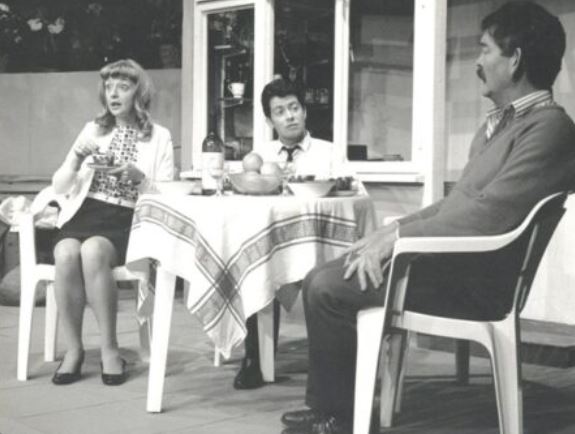Alan Ayckbourn is one of the most prolific and celebrated playwrights of modern times, with over 80 plays to his name. His works span a wide range of themes, including human relationships, social satire, and the complexities of modern life. His distinctive use of structure, character development, and humor has made him a key figure in contemporary theatre.
Notable Plays by Alan Ayckbourn
1. “Relatively Speaking” (1965)
This early success established Ayckbourn as a master of farce and mistaken identity. The play revolves around a young couple, Greg and Ginny, whose relationship takes an unexpected turn when Greg visits Ginny’s supposed parents, leading to a series of comic misunderstandings.
2. “The Norman Conquests” (1973)
A trilogy of interconnected plays – “Table Manners,” “Living Together,” and “Round and Round the Garden” – these works explore the same events from different perspectives. The trilogy follows the antics of the charming yet self-centered Norman, whose attempts to seduce his in-laws lead to a weekend of chaos. The plays can be watched individually, but together, they offer a brilliant and comedic examination of human behavior and relationships.
3. “Absent Friends” (1974)
This dark comedy takes place during an awkward tea party between old friends. As the group tries to cheer up a recently bereaved friend, old tensions and hidden grievances bubble to the surface. The play offers a biting critique of social niceties and personal delusion.
4. “Bedroom Farce” (1975)
Set in three different bedrooms, “Bedroom Farce” is a humorous and insightful exploration of marriage and relationships. Four couples’ lives intertwine over one chaotic evening, filled with humor and frustration. The play’s use of simultaneous action across multiple locations showcases Ayckbourn’s innovative narrative technique.
5. “Just Between Ourselves” (1976)
This play is one of Ayckbourn’s darker comedies, focusing on the collapse of two marriages. Through its portrayal of two seemingly happy couples, the play explores themes of domestic unhappiness, isolation, and emotional cruelty beneath the surface of suburban life.
6. “Joking Apart” (1978)
This play spans 12 years and examines how time impacts relationships. It contrasts the lives of two couples, one consistently happy and successful, and the other struggling with life’s challenges. Ayckbourn’s sharp observation of jealousy and contentment highlights the subtle emotional shifts in human connections.
7. “Season’s Greetings” (1980)
Set during the Christmas holidays, “Season’s Greetings” is a darkly humorous look at the dysfunctionality of family life. Ayckbourn exposes the tensions and secrets that simmer beneath the surface as the festive season brings out both the best and worst in people.
8. “A Chorus of Disapproval” (1984)
This play explores ambition, betrayal, and small-town life through the lens of an amateur operatic society. As a new member rises through the ranks, his personal life becomes entangled with the petty rivalries and romantic intrigues of the group. The play cleverly blends comedy with a satirical look at human nature.
9. “Woman in Mind” (1985)
One of Ayckbourn’s more introspective and psychologically complex works, “Woman in Mind” tells the story of Susan, a woman whose life unravels as she becomes increasingly detached from reality. The play explores themes of mental health, family dynamics, and the boundary between fantasy and reality.
10. “Communicating Doors” (1994)
A unique blend of science fiction and thriller, “Communicating Doors” involves time travel, murder, and a woman who accidentally stumbles into the past through a hotel door. The play offers an entertaining and gripping narrative that explores the possibility of changing fate.
11. “House and Garden” (1999)
These two plays are designed to be performed simultaneously on two adjoining stages. “House” takes place inside a country home, while “Garden” unfolds in the garden outside. The same characters move between both plays, creating an interconnected story that offers different perspectives on the same events.
12. “Private Fears in Public Places” (2004)
This play explores the intersecting lives of six people in a large city, highlighting their private struggles and the emotional isolation they experience in public spaces. Ayckbourn’s use of fragmented scenes and understated drama provides a poignant look at loneliness and human connection.
13. “Life and Beth” (2008)
A reflective comedy-drama, “Life and Beth” centers on Beth, who is visited by the ghost of her recently deceased husband during Christmas. The play explores themes of grief, moving on, and the complexities of family relationships.
Themes in Ayckbourn’s Work
- Relationships and Marriages: Many of Ayckbourn’s plays delve into the intricacies of relationships, focusing on the ups and downs of marriages, love, and infidelity.
- Social Satire: Ayckbourn often uses humor and satire to comment on middle-class life, exposing the hidden tensions and flaws of seemingly normal families and communities.
- Innovative Staging: Ayckbourn is known for his experimental use of staging, with plays like “House and Garden” and “The Norman Conquests” showcasing his talent for creating interconnected, multi-perspective narratives.
- Psychological Depth: While known for his comedies, Ayckbourn also delves into more serious themes like mental health (“Woman in Mind”), isolation (“Private Fears in Public Places”), and personal ambition (“A Chorus of Disapproval”).
Legacy and Influence
Alan Ayckbourn’s plays have been performed around the world and translated into numerous languages. His ability to blend humor with insightful social commentary has made him one of the most celebrated playwrights in the English-speaking world. His body of work not only entertains but also invites audiences to reflect on the complexities of modern life, relationships, and the human condition.
With over 80 plays, Alan Ayckbourn’s contribution to theatre is unparalleled. His mastery of character-driven drama, social satire, and innovative narrative techniques has left a lasting mark on modern theatre. Whether exploring the dark side of relationships or poking fun at societal norms, Ayckbourn’s plays remain relevant and widely appreciated for their wit, humanity, and insight.




